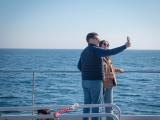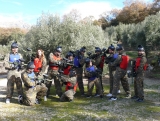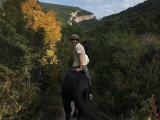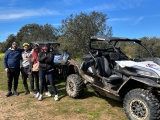The Club de las 25 hosted a grand event last night at Madrid’s Hotel Palace, attended by many familiar faces from politics, film, television, and sports. As it does every year, the Club presents awards to those who most represent and champion women’s presence—in a spirit of solidarity—across all areas of life.

The ceremony, presided over by the First Deputy Prime Minister, María Teresa Fernández de la Vega, featured contributions from professionals such as Rosa María Calaf, who hosted the event, writer Lucía Etxebarría, Karmele Marchante as the Club’s president, and Pedro Zerolo, Secretary of Social Affairs and NGO Relations for the PSOE.
Edurne Pasaban was among the awardees, recognised as the only Spanish woman to summit all 12 eight-thousanders. The prize—a fan designed by Lolita Flores—was presented by Telecinco journalist Sara Carbonero. Alongside the mountaineer, the efforts of Amenábar, Blanca Portillo, and Lola Herrera, among others, were also celebrated.

Yumping.- From a very young age in the mountains... starting with your parents, no less. They introduced you to hiking, and you took it from there. How did it all begin?
Edurne Pasaban.- As you rightly said, I started young, hand in hand with my parents—the Basque Country is a mountainous region, so it offers plenty of opportunities. I signed up for a course in my hometown, Tolosa, and there I met new people, new friends. I took it step by step, and the path guided me.
Y.- By 16, you were already scaling peaks over 4,000 metres, and a year later, you summited Chimborazo, over 6,000 metres. Quite a different adolescence, wasn’t it?
E.P.- Yes, it was a different adolescence. I had my school friends, but also another group—older climbing mates who went to the mountains, went out... I had two circles: lifelong girlfriends and climbing friends. Honestly, I didn’t enjoy sitting in the park eating sunflower seeds on Sundays, so I leaned into climbing—I preferred it.
Y.- What does daily training for this sport look like?
E.P.- Now, my days are highly structured, with training in Barcelona. At first, it was more at my own pace—hiking and fitting training around work. But one day, I decided to dedicate myself fully to this.
Y.- That’s when you left your engineering career, right?
E.P.- Yes, I left engineering, stopped working with my father, and now focus entirely on training and events like these.
Y.- How do you plan each expedition?
E.P.- Now it’s easier—I’m part of the Spanish TV team "Al filo de lo imposible," so we’re a well-established group. The same team goes from one expedition to the next, so it’s streamlined. We arrived last Wednesday, and the programme director has already called to plan next year’s Annapurna climb. I have a great support network around me.

Y.- Climbing is a profession where teamwork is crucial. Is living together in high-altitude conditions tough?
E.P.- It’s hard—24 hours with the same people in the same place. Even though we’re close friends, friction happens. But the upside is that we know each other so well, we understand each other’s needs.
Y.- What about competitiveness?
E.P.- There’s always the race to finish the 14 eight-thousanders—I’m up against a Korean and an Austrian climber to see who gets there first. But this rivalry is more media-driven; between us, there’s no competition.
Y.- How do you handle expeditions where you must turn back without summiting, like on Shisha Pangma?
E.P.- You have to accept the highs and lows. Deciding to abandon a climb, as we recently did, is tough. The pressure grows—sponsors, media, people watching... But when it’s impossible, it’s impossible. I’d rather return home than not return at all.

Y.- On your website, you post updates about your daily experiences, the weather... You’re very active online, where fans send supportive messages. Does this keep you connected to them and your family?
E.P.- I love it—sharing my expedition feelings is key. The warmth and support from people are vital when you’re on a mountain. I’m deeply grateful; it’s essential in my line of work.

Y.- The Club de las 25 honours you tonight for your career. How does that feel?
E.P.- It’s fantastic. I’m thrilled—lately, I’ve received many awards, and this recognises years of work. Ten years of eight-thousanders; early on, no one knows you, but you plant seeds. Now, I reap the rewards with joy and affection.

Y.- One of the Club’s goals is advocating for women’s rights and their place in society. Your award celebrates your climbing achievements. Should women have a greater role in sports?
E.P.- Women often step back from professional sports at my age, due to family or motherhood. But I believe women should stay active, even if not professionally. Sport is growing among women—this summer in the US, I was amazed by how active everyone was. I saw women over 40 climbing at the gym like it was routine.

Y.- In a traditionally male-dominated profession, how do you navigate that?
E.P.- As you say, men have always taken the spotlight, not just here but in many sports. Even now, climbing is male-heavy—I’m surrounded by men daily on expeditions. In shared living, it’s noticeable. Throughout my career, I’ve had to prove myself repeatedly because I’m a woman.
Photographs: Deivi Ruiz











